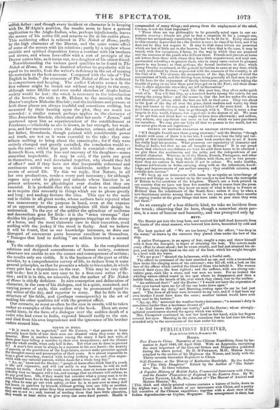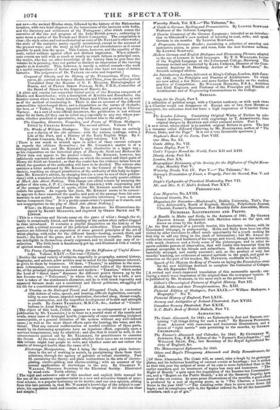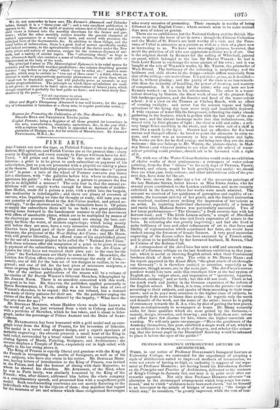PUBLICATIONS RECEIVED, Frost October 28t4 to Nom other 3d.
Booxs.
Two Years in China. Narrative of the Chinese Expedition, from its for- mation in April 1840, till April 1842. With an Appendix, containing the most important of the General Orders and Despatches published during the above period. By D. M'PnEason, M.D., Madras Army, attached to the service of his Highness the Nizam, and lately with the Thirty-seventh Grenadier Regiment in China. Self-Devotion; or the History of Katherine Randolph. By the Author of "The Only Daughter." Edited by the Author of "The Subal- tern," &c. In three volumes. Popular History of British India, Commercial Intercourse with China, and the Insular Possessions of England in the Eastern Seas. By W. COOKE TAYLOR, LL.D., &c., Author of" The Manual of Ancient and Modern History," &c.
[This thick and closely-printed volume contains a history of India, down to the Afghan war; a brief sketch of our intercourse with Chins, and a pretty full narrative of the Chinese expedition; together with a short view of the Indian dependencies—as Ceylon, Singapore. The arrangement is clear, bat
not new—the ancient Hindoo story, followed by the history of the Mahornetan invaders, with two brief chapters on the intercourse of the ancients with India, and the discovery and settlement of the Portuguese ; after which comes the narrative of the rise and progress of the Indo-British power ; embracing in some sense a notice of the French and Dutch Companies. The compilation is clear ; the style sober, and not so rhetorical u some of Dr. TAYLOR'S other works ; the scale of the narrative pretty equally maintained, except in the account of the present wars; and the story as full of facts and circumstances as it seems possible to pack into the space. This feature, however, and the equality of the scale, rather militate against effect and distinct impression. When subordi- nate events are told with as much or nearly as much fulness as principal ones, the reader, who has no other knowledge of the history than he gets from the volume he is perusing, does not gather so distinct an impression of the turning epochs as is desirable. This, however, is merely a critical remark—the work is a useful compendium of Indian story for those who have not more elaborate histories. The judgments of Dr. TAYLOR are calm and impartiaL]
Conquest of Siberia, and the History of the Transactions, Wars, Com- merce, iv. carried on between Russia and China, from the earliest period. Translated from the Russian of G. F. MULLER, Historiographer of Russia, and of PETER SIMON Parmas, M.D., F.R.S., Counsellor of the Board of Mines to the Empress of Russia, &c.
[A plain and concise but somewhat formal précis of the Russian conquests of Siberia and Kamtchatka ; with a description of Kiachta and Zuruchaitu, the frontier-towns where the trade between Russia and China is carried on, as well as of the method of conducting it. There is also an account of the different commodities interchanged there, and a disquisition on the nature of rhubarb; the beat, or "Turkey," being imported from Russia, and growing in Chinese Tartary. As a sort of semi-official document, the publication is not without value for its facts, (if they can be relied on,) especially to any one whose pur- suits, whether practical or speculative, may interest him in the subject.]
The Comedies, Histories, Tragedies, and Poems of William Shakspere. Edited by CHARLES KNIGHT. The second edition. Volume VI.
The Works of William Shakspere. The text formed from an entirely new collation of the old editions: with the various readings, notes, a Life of the Poet, and a History of the Early English Stage. By .T. PAINE COLLIER, Esq., F.S.A. In eight volumes. Vol. VL [There is not much to remark upon in either of these current volumes as regards the editions themselves ; for Mr. COLLIER'S matter is of a bibliographical kind, and Mr. KNIGHT'S only illustrative in a larger way ; as his disquisition on the historical playa of Henry the Sixth and Richard the Third does not appear in the present volume. Mr. KNIGHT, however, has judiciously reprinted the earlier dramas, on which the second and third parts of Henry the Sixth are founded, so that the reader has the evidence before him on which the question of the authorship will have to be decided. The volume also contains a letter addressed by Mr. KNIGHT to the Council of the Shakspere Society, touching an alleged prostitution of the authority of this body to depre- ciate Mr. KNIGHT'S edition, by charging him (in a note to one of their publica- tion.) with a mistaken inference through not consulting the early quarto edition of Much Ado About Nothing. This charge our editor retorts by accusing the author of this note, J. P. C., (meaning Mr. COLLIER,) with suppressing part of the passage he professed to quote, whilst Mr. KNIGHT asserts that he did collate the quarto. As regards the facts, Mr. KietoEIT seems to be correct : he appears to have examined the quarto, and part of the passage from his com- mentary is not quoted. As regards the respective inferences, "non nostrum tantas componere litas." it is a pretty commentator's quarrel as it stands, and not inappropriate to the play of Much Ado About Nothing.]
Whist; its History and Practice. By an Amateur. Its Illustrations de- signed by %Emir MEADOWS, and engraved by Ormin &mix and W. LINTON.
[This is a vivacious and literate essay on the game of whist ; though the vi- vacity is occasionally forced, and the reading of the author often rather dragged in than introduced. It contains a playful disquisition on the history of the game, with a critical account of the principal authorities. These preliminary, matters are followed by an exposition of some general principles of the art of whist-playing, with rules for the different hands—leading, second, third, and fourth; the Taws of the game, and a few miscellaneous remarks. The rules are intelligible in themselves, clearly expressed, and we should say easy of re- collection. The little book is handsomely got up, and illustrated with a variety of spirited wood-cuts.]
The Penny Cyclopedia of the Society for the Diffusion of Useful Know- ledge. Volume XXIV.—Tai-wan—Titlarks.
[Besides the usual variety of subjects, especially in geography, natural history, biography, and science, a few articles may be noted for the Importance inherent, or given to them by treatment. Of these, "Theatre," in addition to the com- mon information, contains very curious statistical tables of the dimensions, &c. of the principal playhouses ancient and modern : "Taxation," which under the head of " direct taxes" discusses the different points thrown up by the late Income-tax: Talleyrand," in whose life, or Apology for a Life, a new view is taken of the statesman's character, and he is with much ingenuity and apparent fairness made out a consistent and liberal politician, struggling all his life for a constitutional government.] A Treatise on the Enlarged Tonsil and Elongated Uvula, in connexion with defects of voice, speech, and hearing, difficult deglutition, suscepti- bility to sore throat, impeded respiration, disturbed sleep, throat-cough, nasal obstruction, and the imperfect development of health and strength in youth. By JAMES YEARSLEY, M.R.C.S., &c., Author of "Contri- butions to Aural Surgery," &c.
[The object of this book, (which appears to us an enlargement of' a former publication by Mr. YEARSLEY,) is to trace to a morbid state of the tonsils and uvula, many cases of deranged health, (especially of cases resembling incipient consumption, or a general irritation of the system without any well-defined cause,) as well as the more direct effects upon the hearing, the voice, and the throat. That any natural malformation or morbid condition of these parts, would by its distressing symptoms have an injurious effect, especially upon a nervous temperament, may he admitted; and also that it would be well, in the circumstances pointed out by Mr. YEARSLEY, for practitioners to examine the throat. At the same time, we doubt whether these cases are so common as this volume might lead people to infer, and whether some are not rather the results of deranged health than the cause of it.] Electrotype Manipulation. Part L being the theory, and plain instruc- tions.in the art of working in metals, by precipitating them from their
solutions, through the agency of galvanic or voltaic electricity. Part
IL containing the theory, and plain instructions in the arts of electro- plating, electro-gilding, and electro-etching ; with an account of the
several applications of electrotype in the arts. By CHARLES V. WALKER, Honorary Secretary to the Electrical Society. Illustrated by wood-cuts. Tenth edition. [The rapid and extensive sale of this succinct and explicit little manual for the use of the amateur experimentalist in a new and attractive branch of prac- tical science, is a popular testimony to its merits; and our own opinion, arising from this late perusal, is, that Mr. Warmen's knowledge of the subject is com- plete, his exposition lucid and concise, and the language of his directions clear and simple.T Waverley Novels, Vol. XX.—" The Talisman," &c. A Guide to German Spelling and Pronunciation. By Ltrownt Sonwarm Professor of the German Language.
A Concise Grammar of the German Language; intended as an introduc- tion to 011endorff's new method of learning to read, write, and speak German in six months. By LUDWIG SCHWABE.
A Progressive German Reader; containing a selection of amusing and instructive pieces, in prose and verse, from the best German authors. By LUDWIG SCHWABE.
Modern German and English Dialogues and Elementary Phrases, adapted to the use of learners in both languages. By T. S. WILLIAMS, Lector of the English Language at the Johanneum College, Hamburg. The German revised and corrected by KARL CRUGER, Director of the Com- mercial Academy in Hamburg, Author of "Den Kaufmann," ese. Seventh enlarged edition.
An Introductory Lecture, delivered at King's College, London, 24th Jann- any 1842, on the Principles and Practice of Architecture. To which are now added, a few Notes, and some further Remarks on the modern practice of Competition. By WILLIAM Hosnrstu, F.S.A., Architect and Civil Engineer, and Professor of the Principles and Practice of Architecture and of Engineering Constructions to the College.
SERIALS.
Songs for the People, Part I. [A collection of political songs, with a Chartist tendency, or with such views as a Chartist would not disapprove of. Except one or two from Mown or ELLIOTT, the collection does not leave a high impression of Chartist litera- ture.]
The London Library. Containing Original Works of Fiction by cele-
brated Authors; illustrated with engravings by T. ARMSTRONG, from original designs by ZEITTER and other eminent artists. Part I. [A. new serial, whose object is to publish original fictions in parts. The first is a romance called Edward Clavering, by Mr. ROSENBERG, author of "The Prince, Duke, and the Page." It is not a very favourable specimen.] Stephens's Book of the Farm, Part VIIL Our Mess, No. XL Combo Abbey, No. VII.
Susan Hoping, Part V.
Cook's Voyages Round the World, Parts XII and XIII.
Handy Andy, Part XL London, Part XX.
Biographical Dictionary of the Society for the Diffusion of Useful Know- ledge, Monthly Part Wavering Novels, VoL IV. Part V.—" The Talisman," &c.
Gurney's Translation of Faust, a Tragedy, Part the Second, Nos. V. and VI.
Doyle's Cyclopedia of Practical Husbandry, Part VIL Mr. and Mrs. S. C. Hall's Ireland, Part XXV.
PERIODICALS.
Law Magazine, No. LVIIL Chemical Gazette, No. L Magazines for November—Blacknood'e, Dublin University, Tait's, Fre- sees, Ainsworth's, North of England, Monthly, Polytechnic Journal, Chemist, Farmer's, Sportsman, New Monthly Belle Assemblee, Mirror.
PICTORIAL ILLUSTRATIONS AND PRINTS.
A Ramble in Malta and Sicily, in the Autumn of 1841. By GEORGE FRENCH Alcoa& Illustrated with Sketches taken on the spot, and drawn on stone by the Author. [As the first attempt of a juvenile tourist, this handsome volume, with its illuminated titlepage, is praiseworthy. Malta and Sicily have been too often visited by abler travellers to afford much opportunity for a youth making his first trip to add any thing to the stock of information ; but Mr. ANGAS de- scribes the scenery and incidents of his voyage and travel, though too minutely, with much clearness and a lively sense of the picturesque, and in other re- spects exhibits powers of observation, that will render this transcript from his journal acceptable to his friends and subscribers. His sketches are distinct, tastefully arranged, and neatly executed; and, as the product of only four months' teaching, are evidences of natural aptitude in the pupil, and good in- struction on the part of his teacher, Mr. Haulms, creditable to both.] Speech of his Majesty the King of Prussia on laying the Foundation-stone for the new buildings destined to complete the Cathedral of Cologne, the 4th September 1842. CA revised and much-improved translation of this memorable speech; con- veying a much truer impression of the original than the newspaper version. It is published by Mr. Scemoss, in the same style as the previous one.] Gilberes Chronological Pictures of English History, Part III.
British Moths and their Transformations, No. XIII. Pictorial Edition of Shakspere, Part XLIX.—" William Shakspere, a Biography." No. V.
Pictorial History of England, Part LXIX.
Scenery and Antiquities of Ireland Illustrated, Part XVIII.
Canadian Scenery Illustrated, Part XXIX.
S. C. Hall's Book of British Ballads, Part VI.
ALMANACKS.
The Comic Almanack, for 1843; an Ephemeris in Jest and. Earnest, con- taining "all things fitting for such a work." By RIGGUM Forum:roe, Gent. Adorned with numerous and humorous illustrations, and a dozen of "right merrie" cuts pertaining to the months, by GEORGE CRUIESHANK.
The Farmer's Almanack and Calendar, for 1843. By CUTHBERT W. JOENSON, Esq., F.R.S., Editor of the "Farmer's Encyclopaedia ; " and WILLIAM Straw, Esq., late Secretary of the Royal Agricultural 80' ciety of England, &c.
The Meteorological Ephemeris, for 1843. Oliver and Boyd's Threepenny Almanack and Daily Remernbrancer, for 1843. [Of these Almanacks, The Comic will, as usual, raise a laugh by its grotesque plates, and its ludicrous handling of current events or humbugs : but it strikes us that this year the subject of some of its cuts is more farfetched than in the earlier numbers, and its treatment of topics less racy and humorous. " The
Right of Search," a quiz upon the inquisition of the Income-tax Commission- ers, and • "Report on the Public Health," a hit at the Sanatory Inquiry, have
most of the vii comica. In some prose illustrations of the months, a good effect is produced by a sort of rhyming prose, as in "The Charter, a Commoue Scene in the year 1943"—" The standing order then to move some dozen did begin ; and in compliance with it, the Speaker ordered in, for all the honourable members, each a go of gin."
We do not remember to have seen The Former's Almanach and Calendar before, though it is a " three-year old"; and a very excellent publication it appears to be. Some of the spirit of modern science and of liberal and enlight- ened views is infused into the monthly directions for the farmer and gar- dener; whilst the other monthly notices describe the general character of natural appearances in a manly rural taste, and record with precision the principal facts of the thermometer, &c. In addition to these things, and the usual tables of information, there is a good deal of matter specifically useful, and indeed necessary, to the agriculturist—tables of the duties under the New Acts, prices and nature of manures, recipes for the common diseases of ani- mals, and a variety of similar topics. The "advertising sheet," as large as the Al:nomad itself, also contains a mass of information, though not quite so disinterested as the body of the work. The principal f store in The Meteorological Ephemeris is its ruled spaces for remarks, and its threefold weather-predictions; one column describing general features "day before or day after," which "may be relied on ; " another more specific, which may be certain in "two out of three cases "; a third, where an attempt is made to prognosticate particular pimenomena on given days, which "must not be depended upon," but will probably prove as accurate as any similar prognostications. The principle on which these calculations are made ill WA given : it seems to be based upon an observation of former years, which though empirical is probably the best guide we have ; and has been dimly fore- shadowed by the poet- " Till old experience do attain
To umething like prophetic strain."
Oliver and Boyd's Threepenny Almanac!: is too well known, for theqnan- tity of information it furnishes at a cheap rate, to require particular notice.]
PAMPHLETS.
Reasons for Promoting the Cultivation of the New Zealand Flax. By F. Dir.LoN BELL and FREDERICK YOUNG junior.
English Patents; being a Register of all those granted for inventions in the arts, manufactures, chemistry, agriculture, &c., in the year 1841: with a copious index. To which is appended an Account of the Re- gistration of Designs new Act for articles of Manufacture. By ANDREW PRITCHARD, M.R.I., &c.




























 Previous page
Previous page